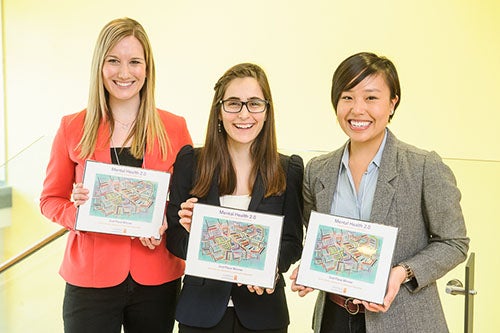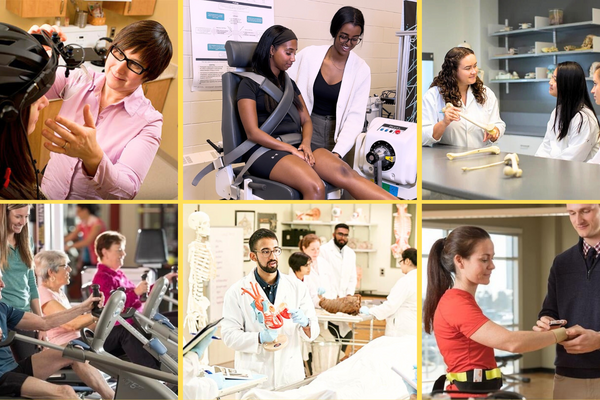
Waterloo students stand up to stigma
Mental health: ‘it’s an issue we think people should be talking about’

Mental health: ‘it’s an issue we think people should be talking about’
By Christine Bezruki Applied Health SciencesIt started with just 30 seconds and a chalkboard. Now an award-winning campaign that saw students across campus show their support for mental health will expand its scope with new peer discussion groups.
Launched in 2012 by three Applied Health Sciences graduate students, the Stand Up to Stigma campaign was designed to start conversations about mental health and shatter the stigma associated with mental illness.

School of Public Heath and Health Systems graduate students Kristin Brown (left) and Stephanie Lu (right), along with third-year Biomedical Sciences student Suzie Alexander (centre), won second place at the Council of Ontario Universities' Mental Health 2.0 competition for their Facebook campaign, Stand up to Stigma.
“When you see someone you care about experiencing a mental illness and you see the stigma associated with it, whether that means they are not able to access care or not able to talk about it, it’s heartbreaking and frustrating,” said Kristin Brown, co-founder of Stand Up to Stigma. “It’s an issue we think people should be talking about.”
Stigma associated with mental illness is a major barrier in seeking help.
Sharing easier on social media
To jump-start the conversation on mental health, Brown, along with classmate Stephanie Lu and four colleagues, took a chalkboard to the Student Life Centre. There, they asked students to spare 30 seconds and share messages of support for mental health that would appear on the campaign’s Facebook page.
One hundred messages later, it was clear Brown and Lu were on to something.
“I think the campaign’s early success illustrates that to put mental health in the open, it’s sometimes easier to use social media,” said Lu, who worked with Campus Wellness and Health Services to launch the campaign.
 Neha Puri, a second-year biomedical sciences student, participates in the Stand Up to Stigma chalkboard campaign to raise awareness about mental health
Neha Puri, a second-year biomedical sciences student, participates in the Stand Up to Stigma chalkboard campaign to raise awareness about mental health
Since the first visit to the Student Life Centre, Stand Up to Stigma has continued to build momentum, supported by 60 undergraduate and graduate student volunteers. In March, the team hosted Spotlight, an art exhibit showcasing pieces inspired by mental health topics.
The campaign’s innovative approach to mental health was recently acknowledged by the Ontario Council of Universities at the inaugural Mental Health 2.0 competition. The team took home second place and a $1,000 prize, which they will put towards new initiatives—including the mental health peer discussion groups.
Discussion groups will provide open forum
Held every other Tuesday starting May 13 from 6 to 7 p.m. in MC 4060, the mental health discussion groups will be moderated by trained student facilitators.
“We want to provide an open safe space for students to talk about mental health in whatever capacity they want,” said Lu, who conducted focus groups with students before deciding on the format of the groups.
“It’s not a service, it’s a place for people to come and talk. It’s a different approach to talking about mental health,” said Brown.
In addition to her work with Stand Up To Stigma, Brown is spearheading Waterloo’s participation in a cross-Canada research project called Unleash the Academia, examining the culture of mental health on university campuses. The findings, which are being compiled at Queen’s University, will be ready next year.
“We are working towards a school culture where people can talk openly about their mental health, and what they’re going through — whether that be to friends or professors, and do so without being afraid of judgment,” said Brown. “We’ve come a long way, but there is still a lot to be done.

Read more
The Government of Canada announces funding to support research in food policies and medical devices

Read more
From optometry and pharmacy to public health and therapeutics, Waterloo alumni are powering Canada’s health care sector

Insignia for Companion, Officer and Member of the Order of Canada. (Photo credit: Sgt Johanie Maheu, Rideau Hall © OSGG, 2019.)
Read more
Alumni and honorary alumni recognized for shaping Canada’s health, policy, justice and financial sectors
The University of Waterloo acknowledges that much of our work takes place on the traditional territory of the Neutral, Anishinaabeg, and Haudenosaunee peoples. Our main campus is situated on the Haldimand Tract, the land granted to the Six Nations that includes six miles on each side of the Grand River. Our active work toward reconciliation takes place across our campuses through research, learning, teaching, and community building, and is co-ordinated within the Office of Indigenous Relations.